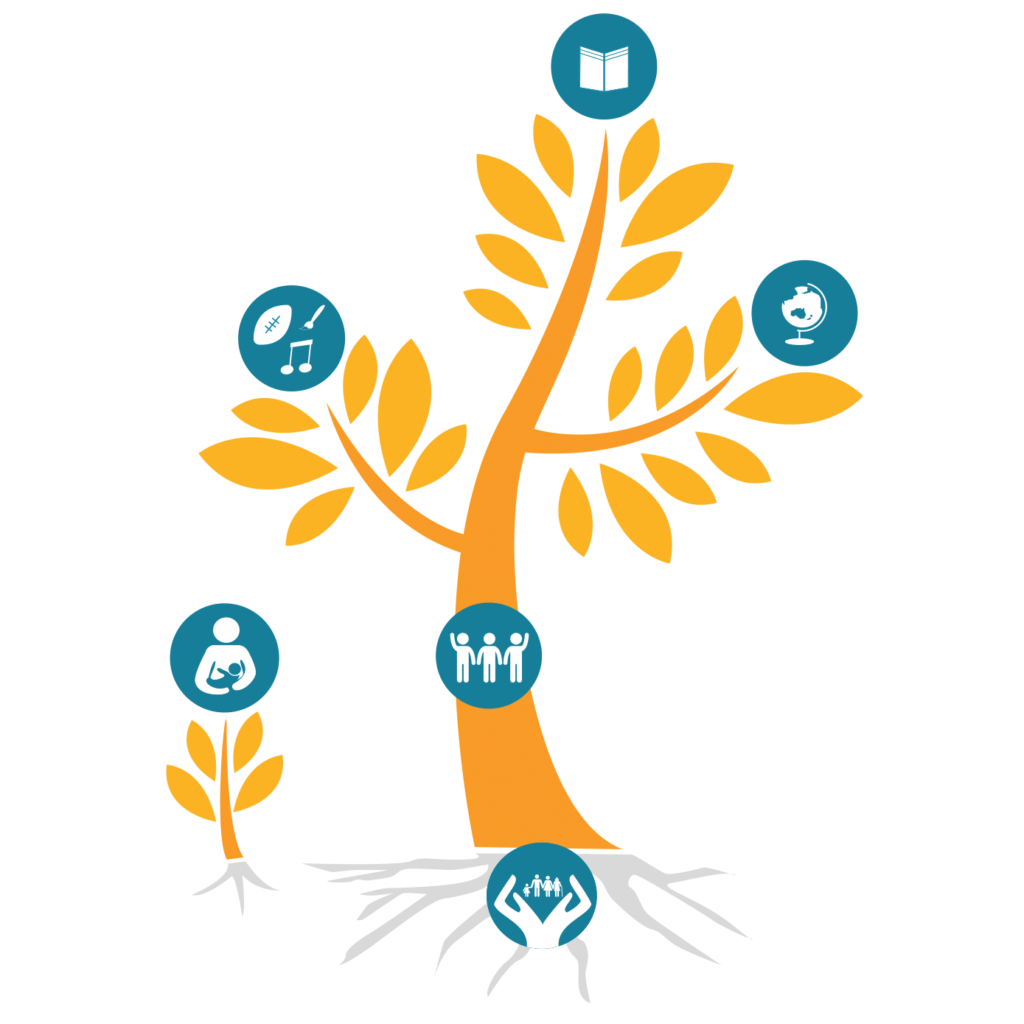
6C education model
The 6C education model is designed to be delivered in any school and consists of Class, Childhood, Club, Community, Civics and Culture. Our outcomes can be achieved for children every day.
Schools can adopt one or many of the 6C domains depending on what specific needs the students have that the school is not currently meeting.
All learning programs have either been built to, or retrospectively mapped to, the Australian Curriculum. Schools are provided a detailed curriculum delivery framework that they can use to align to their schools curriculum plan.

The purpose of the Childhood domain is to address the social, emotional, intellectual and physical development needs of every child so they are as prepared for formal schooling as mainstream children.
Features:
- Customised programs aligned to evidence based practice and the National Quality Framework for three and four year olds that cover development needs and guarantee students are prepared to successfully transition to school at the same level as mainstream children
- Language and pre-literacy development needs
- Customised support for parents of three and four year olds to increase successful transition to school
- Case managed early intervention strategies for three and four year olds to close social, emotional, intellectual and physical development gaps
- Case managed maternal health and well-being support to mothers of three and four year olds that increases their capacity to raise healthy, well-developed children
- Positive parenting program support for parents of three and four year olds so parents learn behaviour management to support their child’s needs and align ‘school’ behaviour to ‘home’ behaviour
The purpose of the Class domain is to ensure all students are at or above grade level in literacy and numeracy and are self-actualised scholars engaged in the wider world so they are academically prepared for success in a high-quality secondary school.
Features:
- Years P-5, literacy and numeracy using Direct Instruction pedagogy to fidelity
- Years 5-6, literacy and numeracy in Explicit Direct Instruction materials and pedagogy
- Positive Behaviours Interventions and Support Systems (PBIS) applied as the classroom and whole-school behaviour management approach
- Aligned to the Australian Curriculum Key Learning Areas of English and mathematics
The purpose of the Club domain is to ensure students develop their musical, artistic educational and sporting talents and passions through formal learning and performance.
Features:
- Years P-6, arts, health and sports in Explicit Direct Instruction materials and pedagogy
- Aligned to the Australian Curriculum Key Learning Areas of the arts, health and physical education
- Students participate in selective program in music, art and sports
- Students participate in compulsory physical education, arts and health
- Delivered in formal classroom settings, dedicated spaces and excursions
- An annual calendar of performances within the school and community linked to the learning program
- Positive Behaviour Interventions and Support Systems (PBIS) applied as the classroom and whole-school behaviour management approach
- Expert partners engaged in curriculum design and delivery
- Strong family and community participation
Our Culture domain provides students with a rich understanding of their culture and history of family, community, country and people. They develop oral and written mastery of their own traditional languages and are fluent in ICT and digital media.
Features:
- For Years P-6, science, technologies and humanities and social science in Explicit Direct Instruction materials and pedagogy (customised content framed around arts, science, society, environment, technology, languages other than English, character development, higher order skills, creative expression and practical activity, with key concepts such as mode switching, identification and interconnectedness)
- Aligned to the Australian Curriculum Key Learning Areas of humanities and social science, technologies, science and languages
- Fluency in communicating through digital media
-
Students participate in early, middle or upper years program
-
Delivered in formal classroom settings, dedicated spaces and excursions such as the annual Culture Camp
-
Underpinned with Positive Behaviours Interventions and Support Systems (PBIS) applied as the classroom and whole-school behaviour management approach
-
An annual calendar of cultural events within school and community linked to the learning program
-
Expert partners engaged in curriculum design and delivery
-
Requires strong family and community participation
The purpose of the Civics domain is to ensure students understand their multi-layered identities and those of others in their community, develop an appreciation of diversity, civic ideals and practices that are critical to civic engagement.
Further that they have the tools and opportunities to practically engage in their local communities and broader communities beyond and be able to ‘orbit’ among them. The program is most relevant to groups who are marginalised from mainstream contexts.
The domain is relevant to schools where students come from geographic, ethnic or socially marginalised backgrounds or conversely want to engage with such groups. This domain delivers formal learning components in the classroom but also has strong features for field trips and excursions with emphasis on cross cultural and social engagement.
Features:
- Customised programs aligned to evidence based practice
- Opportunities for parents to participate in excursions and events to increase community engagement
- Customised options for volunteering or charity work and engagement with other social support groups
- Excursions to own and other cultural groups to spend time engaging in cultural practices, activities and events
- Excursions and participation in parliament and other civic institutions
The purpose of the Community domain is to support families to engage in every child’s education, health and well-being, so that students regularly attend school, are school ready and successfully transition into high-quality secondary schools at the same rate as mainstream children.
Features:
- Teachers trained in parent and family engagement to increase their capacity to ensure their children are school ready and attend school on time everyday
- Case management of students and families who are not school ready or have patterns of poor attendance
- Case management of identified students (coordinated with health professionals and parents) to improve health, well-being and development issues impeding their learning
- Arrangements with medical professionals to address student health and well-being
- Positive parenting programs so parenting aligns ‘school’ behaviour with ‘home’ behaviour
- Teachers promote signing up students to a Student Education Trust to enable parents to save for and purchase education products and services to meet their child’s education needs
- Food club providing meals during the school day (including extended school day) paid for by parents
- Case management of Year 5-6 students to ensure they are academically, socially, emotionally and materially ready, and enrolled in secondary school
- Inclusion of school graduates in activities like Band Camp and ‘big brother’ mentoring of primary students

